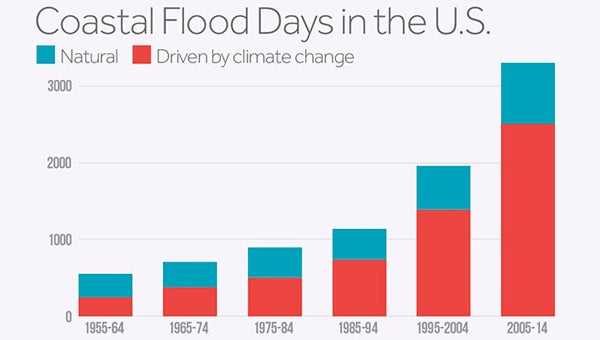Support our wildlife refuge managers
Published 6:36 pm Friday, April 29, 2016
When I read Bill McKibben’s “The End of Nature” a number of years ago, the part that struck me the most was not all of the dangerous things that climate change could bring, but the prologue. Every 10 years, he updated the book, and each decade the prologue would read something along the lines of, “nothing much has been done to stop it.” McKibben wrote the book in 1989 and discussed congressional hearings on the greenhouse effect, as it was called then. In the 28 years since those hearings, while we’ve managed to cram the entire Internet into the palm of our hand, not enough was done and we are now experiencing the changes that at the time were doomsday prophecies.
Hyde, Tyrrell and Washington counties have experienced flooding this year due to abnormally high amounts of rainfall. Some local residents and farmers are upset at the managers of the national wildlife refuges in these counties. The problem with living less than three feet above sea level is that it doesn’t take much to flood your land. Combine three inches of extra rainfall, a high tide and westward winds and your land is flooded. But this is different than before.
The idea of nuisance flooding is starting to spread among coastal communities. Instead of thinking about climate change as a monstrous tidal wave washing everything away or a steady sea-level rise that will turn our area into ocean, it makes more sense to think of nuisance flooding. The three inches of sea level rise that has occurred over the past 15 years means that we now live three inches closer to sea level. That means when it rains, it is easier for creeks and ditches to back up. The water stays on the land longer. Whereas it used to take four inches of rain to cause any flooding, it now takes one inch. You don’t get four inches of rain dumped on you very often, but an inch: that’s more common.
This means that a long day of thunderstorms can now cause the kinds of damage we would have expected from a tropical storm in the past. Now the road to your land will be muddy all the time, your septic system will back up regularly and it will make farming in this area more unfeasible. We don’t have to wait until the seas rise four feet before people leave the area. If you own farmland and it is constantly saturated, it’s basically useless to you now.
We are a frontline community. There are few places on the entire east coast that will be as negatively affected by climate change as the Albemarle-Pamlico Peninsula. We may lose most of Dare, Hyde and Tyrrell counties in the coming decades. It’s important that we stop thinking about climate change as something that may happen somewhere else, to someone else. It is happening here. It is happening to us.
So who do we point the finger at in all this? It was not the people in Hyde County who have stalled climate action all this time. We have known about this issue for a long time, but we have not taken any serious action because the industries behind this catastrophe have put all their power and money into stopping change. And that brings us to climate justice: the idea that the people who caused this problem should be the ones to help out the people who are suffering the most. Just like the tobacco lawsuits, the tobacco farmers should not be the ones to suffer for the lies, manipulation and greed of the tobacco industry.
When the Deepwater Horizon catastrophe occurred there were a number of clearly guilty parties, including BP and its contractors. Huge penalties were charged and reparations have been made to the coastal communities and businesses that lost everything due to BP’s wrongdoing. In our case, there is not the same direct line leading to a guilty party, but the tobacco lawsuits show that it can be done. The fossil fuel industry has the deep pockets we will need to bail out the coastal communities who are facing oblivion due to their intentional deception.
The point in this is not necessarily to sue the fossil fuel industry, though I suspect people will eventually embrace this idea, but to point fingers in the right direction. The managers of Alligator River, Mattamuskeet, Pocosin Lakes and Swanquarter national wildlife refuges are not to blame for the current problems. The work they are doing now is making the best of a bad situation. We need to repair the damage done by years of ditching and draining because those ditches are going to accelerate saltwater intrusion inland. The ongoing Whipping Creek Fire is a great example of why we should support refuge managers’ projects to keep peat soils saturated with water.
The U.S. Fish and Wildlife Service needs our support. As one of the largest landowners in the region, it will play an important role in how we adapt to the changes underway on the peninsula. We cannot let the chatter of a few well-connected landowners turn our politicians against some the best progress our region has made to combat climate change.
Attila Nemecz is the president of Pamlico-Albemarle Wildlife Conservationists.






